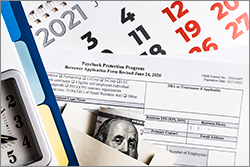Legislation provides other business relief provisions
 Here’s what you need to know about the Paycheck Protection Program (PPP) loans and other business relief provisions of the recently-passed American Rescue Plan Act.
Here’s what you need to know about the Paycheck Protection Program (PPP) loans and other business relief provisions of the recently-passed American Rescue Plan Act.
PPP loan application deadline extended. The deadline to apply for PPP loans is now May 31, 2021.
Sick leave extended. If your business provides sick leave for COVID-related reasons, you might get reimbursed for the sick pay through a tax credit.
- Businesses which voluntarily provide sick leave through September 30, 2021 qualify for the credit. There are limits for each employee. However, for employees who took 10 days of sick leave in 2020 using this same provision, they can take another 10 days beginning April 1, 2021.
- Refundable tax credits are available through September 30, 2021.
- Covered reasons to get the tax credit now include sick leave taken to get COVID testing and vaccination, and to recover from the vaccination.
- These benefits are also extended to self-employed workers.
Family Medical Leave Act Provisions extended.
- Additional coverage is now available through September 30, 2021.
- Qualified wages for this provision move to $12,000 (up from $10,000) however the credit was not increased.
- The Family Medical Leave Act also applies to the self-employed.
Big increase in Employee Retention Credit.
- Businesses can get up to a $28,000 tax credit per employee in 2021, up from a $5,000 maximum credit in 2020. This credit can be claimed through Dec. 31, 2021.
There are many more provisions in the close to $2 trillion dollar spending package, including money given to states. As everyone digests this new 500-plus page piece of legislation, more clarifications will be forthcoming from the IRS and other sources.
Individual tax return deadline moved to May 17
Congress’ recent move to retroactively make a portion of 2020 unemployment income tax-free is creating havoc during this year’s tax filing season. Here is what you need to know.
Background
Unemployment compensation was received by millions of Americans during 2020 because of the pandemic. While unemployment income was necessary for many who lost a job, it’s also normally classified as taxable income to be reported on your tax return. Recently-passed legislation now makes the first $10,200 of 2020 unemployment compensation tax-free on your tax return.
The problem
The new legislation which contains this tax break didn’t become law until March of 2021, a full three months after the end of the tax year and after millions of Americans had already filed their 2020 tax return!
Understanding your situation
- If you’ve already filed your 2020 tax return: Wait for further instructions. The IRS is trying to figure out a way to automatically apply this tax break for taxpayers who have already filed their 2020 tax return. This will avoid the need to file an amended tax return. There is no need to call at this time as the IRS has not provided further guidance.
- If you HAVE NOT filed your 2020 tax return: The IRS has issued guidance on how to report this tax break on your 2020 tax return if you have not already filed. You will be notified once your tax return has been prepared.
- Tax deadline moved to May 17. Because of all this havoc, the April 15 deadline for individual tax returns is now May 17. This extension applies only to Form 1040s. First quarter estimated tax payments for the 2021 tax year are still due by April 15.
Be assured you will be informed once the IRS issues further instruction on how to claim your tax break. In the meantime, enjoy the extra tax savings you’ll get sometime in the near future!
Since you can’t get away from taxes, the best thing to do is be prepared for them. If you own a small business, taxes become a bit more complicated, but there are several ways to make sure tax time is less stressful. Here are tips 1 and 2 for small business owners.
- Think Taxes Year Around
Thinking about your taxes all year does not seem to be a way to avoid stress, but in reality, tax planning is a year-round activity when you run a small business. If you keep up with documentation and recording requirements throughout the year, you are more likely to arrive at tax time with the right paperwork ready to go.
It is also easier to take advantage of tax savings and deductions over the course of time instead of trying to put together a package of write-offs at the last minute.
- Keep accurate records all year
- Save all business related receipts, both paper and electronic, and log them for easy access
- Keep mileage logs and other expense records so they are accurate
You will find tax time much less stressful, and you will be set up to monitor changes from year to year.
- Keep Up with the Tax News
It may seem that the legislature does nothing, but laws do get passed every year. You need to keep an eye on happenings in the federal government that can impact your tax liability and business organization.
For example:
- The Affordable Care Act is still rolling out. As of 2015 it applied to businesses with 51 to 99 employees and carried stiff penalties for failing to provide health insurance to employees. Penalties also applied if you did not report the type of coverage you provided.
- Taxation of online sales is still winding its way through Congress. You need to monitor the situation, so you know if it becomes law and how it could affect you if you are an online seller if you gross more than $1 million annually.
- The Section 179 Property Deduction was extended but not made permanent. It allows business to deduct the full amount of eligible property as expenses in the year the business began using it. “Property” includes any property used in manufacturing, transporting, and producing goods, any facility used for business or research, or any buildings used to hold livestock or horticultural products.
Tax laws change all the time; keep up with the business news for ongoing legislation or last minute tax breaks.